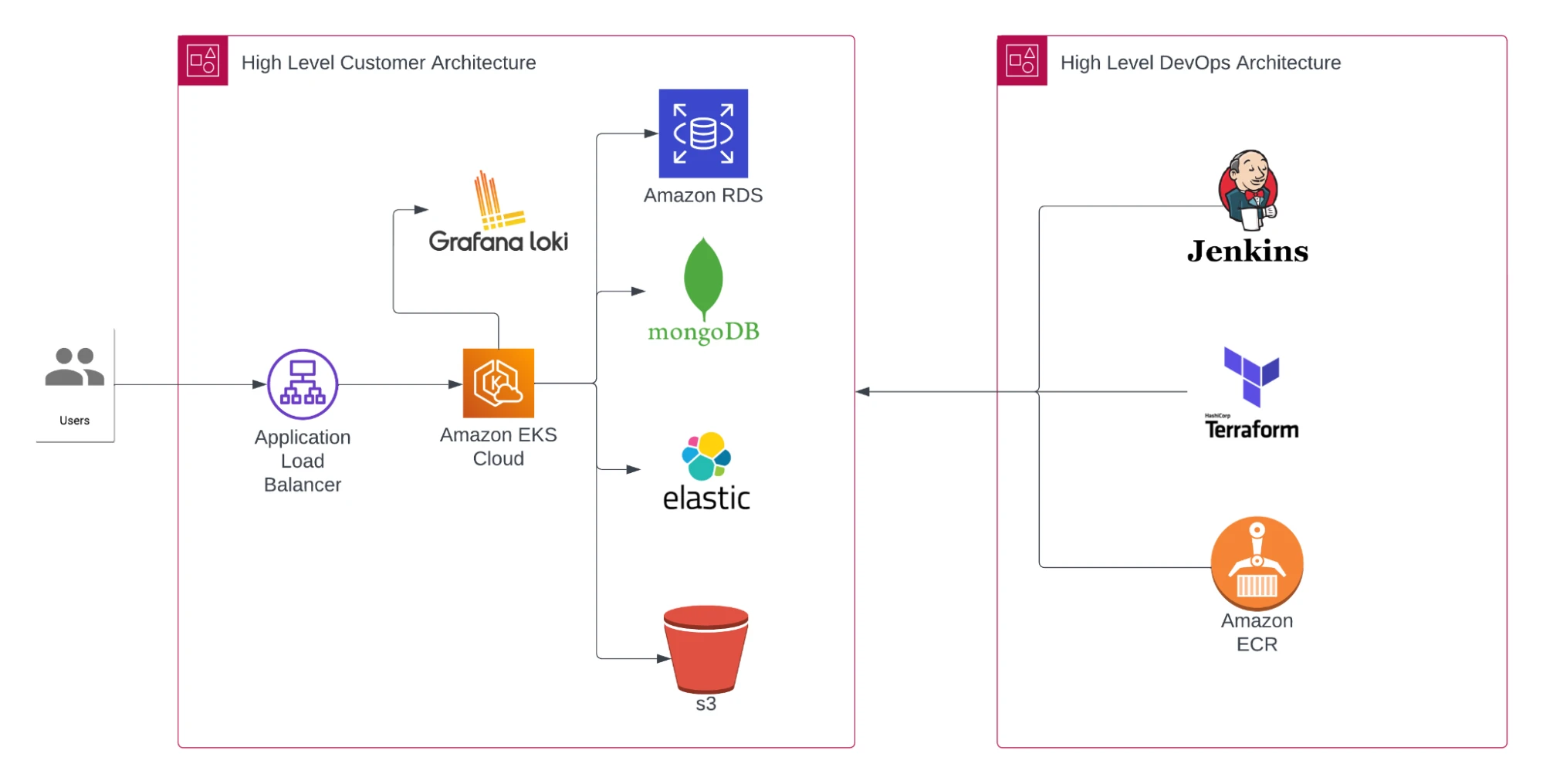
Caylent Services
Infrastructure & DevOps Modernization
Quickly establish an AWS presence that meets technical security framework guidance by establishing automated guardrails that ensure your environments remain compliant.

Availity is able to offer significantly better customer experiences, from on-boarding to data upcycling, improving data driven outcomes for their customers. Working with Caylent, Availity accelerated infrastructure deployment by 500%, and gained technical know-how to scale their infrastructure seamlessly.
→ Migrated their Fusion data-upcycling platform to Kubernetes, ensuring standardized deployments and improved operational efficiency.
→ Leveraged Infrastructure as Code and CI/CD Pipelines to automate infrastructure updates over future iterations.
→ Deployed Fusion on Red Hat OpenShift for The US Department of Veteran Affairs and facilitated security scans and iterative updates to address vulnerabilities and enhance application performance.
→ Leveraged Amazon EKS to unify deployments and streamline infrastructure management.
→ Accelerated infrastructure configuration and deployment times by more than 5X, from 5 hours to 1 hour.
→ Improved flexibility and interoperability across customer environments, enhancing customer experiences.
→ Expanded infrastructure compatibility for their application, opening up their services to a broader range of customers.
→ Automated infrastructure management and deployment, unlocking time and resources.
→ Enabled better scaling capabilities, improving customer experience, cost efficiency, and support for a growing user base.

Availity is a healthcare information technology company that offers software solutions to integrate and manage clinical, administrative and financial data supporting healthcare plans, providers and vendors. Based in Jacksonville, Florida, Availity was founded in 2001 and serves various health care providers, including physician offices, hospitals, integrated delivery networks, and more with key patient insights to improve the delivery of care and optimize operations.
In August 2022, Availity acquired Diameter Health to integrate the company’s data upcycling technology into Availity’s clinical data gateways. Diameter Health’s API Fusion technology automates the process of upcycling clinical data in real-time, turning inconsistent, multi-source and multi-format data into a robust longitudinal data asset, eliminating challenges that limit data usability and exchange, such as non-conformant codes, details buried in text, and information delivered in multiple formats or from multiple sources.
Prior to its acquisition, Diameter Health grew rapidly as a startup. Their infrastructure was set up on AWS from day 1, with their workloads and code base running on a mix of Amazon EC2 instances and Kubernetes. As the company grew, their infrastructure configuration faced challenges with comprehensively scaling and supporting their Availity Fusion platform.
The company’s technical leadership determined that they needed to migrate to a more streamlined version of their infrastructure, hosting their data stores to AWS managed services and leveraging Kubernetes to run workloads, APIs and operators for every software component of Fusion. Their goal was to unify deployments across their customers, and improve interoperability, flexibility, and security by making it easier for their customers to use Availity Fusion platform within their own environments.
Availity wanted the migration effort to minimize operational downtime and decided that it could not be achieved fast enough using internal resources. They sought a technical partner with deep experience and expertise deploying containerized solutions on AWS, engaging Caylent after an introduction through AWS.
Parallel to the infrastructure migration effort, Availity also sought help from Caylent to research new auto-scaling types and to reduce costs the company was experiencing in their dev accounts. Lastly, Availity was looking for support with enabling their applications and workloads to operate on Red Hat OpenShift for one of their key customers - The US Department of Veterans Affairs (VA).

“We were impressed by the Caylent team’s knowledge and technical expertise. They worked collaboratively with our CloudOps and DevOps teams to strategize a smooth infrastructure migration, enable our teams on Red Hat OpenShift processes and capabilities, and support us through implementation.”
Dmitry Baranovsky
VP of Software Engineering

The Caylent team worked hand in hand with Availity’s VP of Software Engineering as well as their Cloud Ops and DevOps resources to scope out how to migrate the remaining pieces of Availity Fusion to a Kubernetes powered infrastructure. During the discovery phase, Caylent also assessed requirements for enabling the Availity Fusion Platform on VA’s Red Hat OpenShift environment and determined the company’s goals for their auto-scaling POC.
Caylent’s resources assessed Availity’s existing EC2 and EKS environments and architected an infrastructure on AWS leveraging only Amazon EKS. Caylent improved Availity’s Terraform code and updated their MongoDB configuration to prepare their CloudOps team to perform the migration. The team also produced data replication and migration cutover scripts and processes, to automate the migration of MongoDB instances for more than 20 Availity customers. Terraform was used to define infrastructure-as-code and CI/CD pipelines were put in place to allow Availity to automate infrastructure updates over future iterations. The automation was demonstrated to the Availity team prior to deployment and the Caylent team provided documentation to ensure Availity’s resources were enabled with their new processes.
After the migration to EKS, the Caylent team began development on the Red Hat OpenShift deployment of the Availity Fusion EKS platform. This process was resource and time intensive and involved significant knowledge transfer to educate the company’s internal resources on an environment they needed more experience with.
The first and most time-consuming aspect of this engagement was translating docker images that were utilized for all of the Availity Fusion software components into OpenShift container images. This required intensive code rewrites, and Caylent’s team worked with Availity’s QA team to ensure these rewritten images worked as expected, before deploying into the OpenShift environment. Secondly, security was a key consideration for VA. Hence, Caylent’s resources invested a significant amount of time into ensuring any vulnerabilities were addressed and workloads were encrypted and FIPS compliant, in line with VA’s requirements.
Caylent deployed a sandbox environment and a QA environment for VA, where their security teams could run scans on the application to discover and report on vulnerabilities. Availity was also provided with a sandbox environment that was as close as could be possible to VA’s deployment OpenShift environment, where their internal development and operational resources could iterate and update their application to address vulnerabilities, deploy features, and maintain operations.
Finally, Caylent helped Availity test multiple solutions for auto-scaling their Kubernetes applications. POCs for various flavors of auto-scaling were demonstrated to the Availity team, with documentation on how to scale with Amazon Graviton queues, or AWS Kafka, leveraging Kubernetes Event-Driven Auto-Scaling (KEDA). The Caylent team ensured that Availity’s resources were armed with the knowledge needed to deploy and optimize auto-scaling configurations for performance and costs.

After migrating their infrastructure to Kubernetes, Availity now has a unified deployment model that improves their flexibility and interoperability across customer environments and ensures consistency in deployments between different customers. This improves the customer experiences they can deliver and optimizes new customer onboarding. The company doesn’t need to worry about managing and scaling underlying infrastructure and can automatically deploy updates and fixes across their environments thanks to DevOps tooling and implementation.
The company’s Fusion platform now works on Kubernetes through EKS, as well as on Red Hat OpenShift for the US Department of Veterans Affairs, enabling the company to support a completely new deployment platform. Their applications and workloads are also FIPS compliant. Hence, Availity has everything they need to support potential public sector customers such as other US government departments with Red Hat OpenShift compatibility requirements. Automations in deployment and infrastructure setup have accelerated Availity’s infrastructure configuration and deployment times by more than 5X, from 5 hours to 1 hour, out of which a large chunk of time is consumed by security checks for vulnerabilities.
Caylent’s auto-scaling research and POCs provide Availity with a variety of options to enable better scaling capabilities, improving customer experience, cost efficiency and support for their growing user base.
Availity’s internal resources now have a far more streamlined infrastructure to support their data upcycling efforts and can focus on delivering the right application experiences instead of managing infrastructure. Availity benefits from an upskilled internal technical team that is now able to operate on a completely new deployment environment, has unlocked time and resources due to automated infrastructure management and deployment, and benefits from expanded infrastructure compatibility for their application, opening up their services to a broader range of customers.

Caylent Services
Quickly establish an AWS presence that meets technical security framework guidance by establishing automated guardrails that ensure your environments remain compliant.

Caylent Services
Innovate at the speed of light with modern applications powered by modular architectures running on purpose-built AWS services.